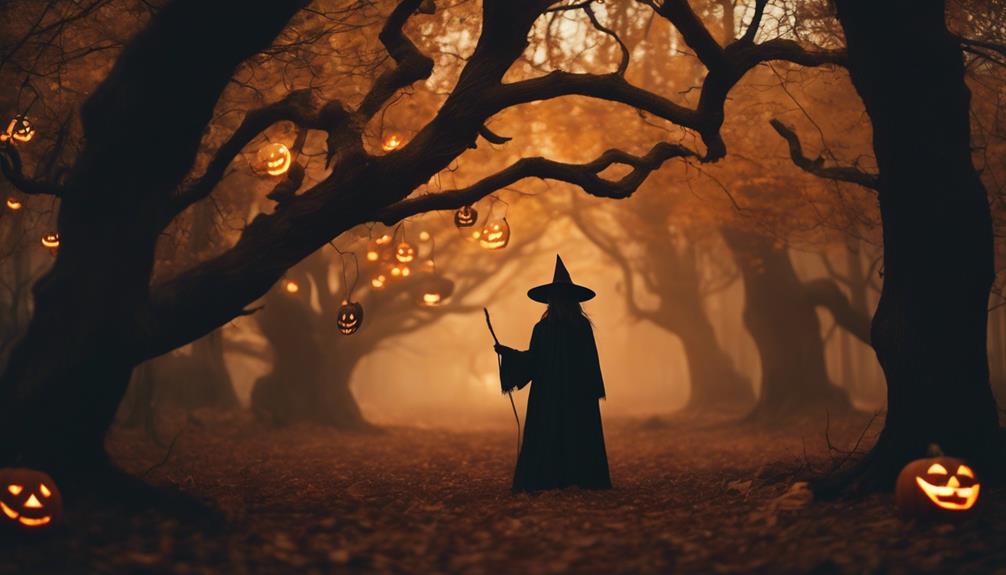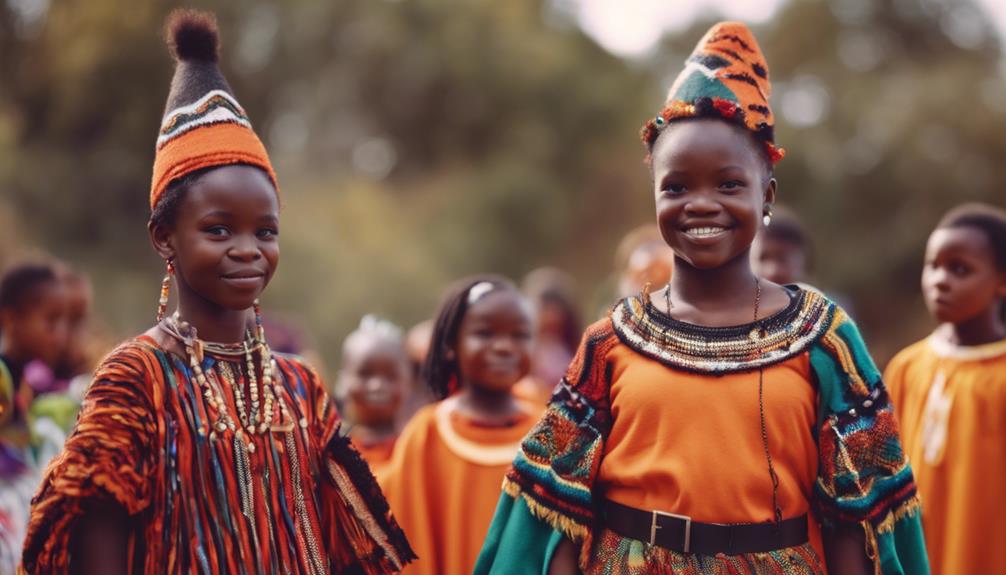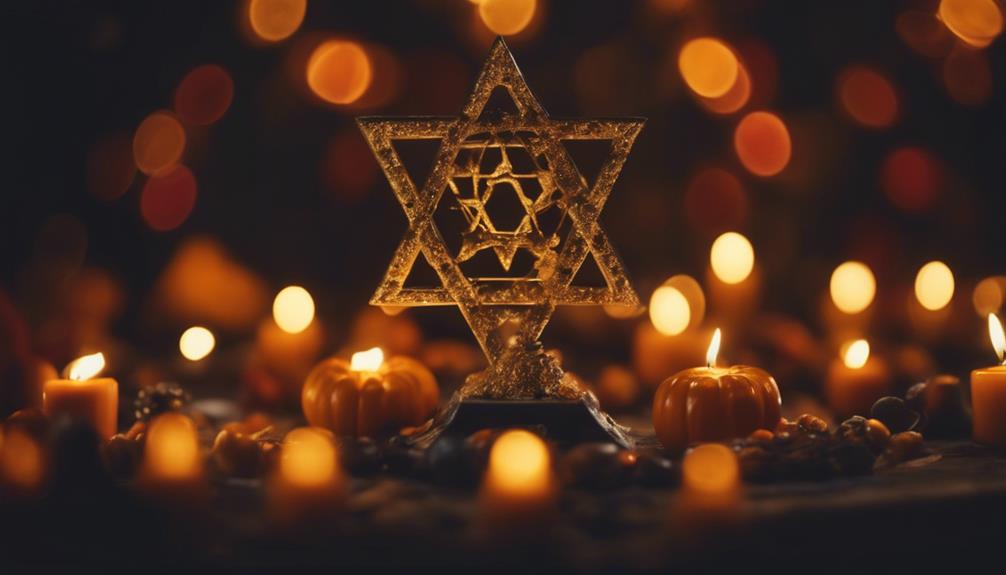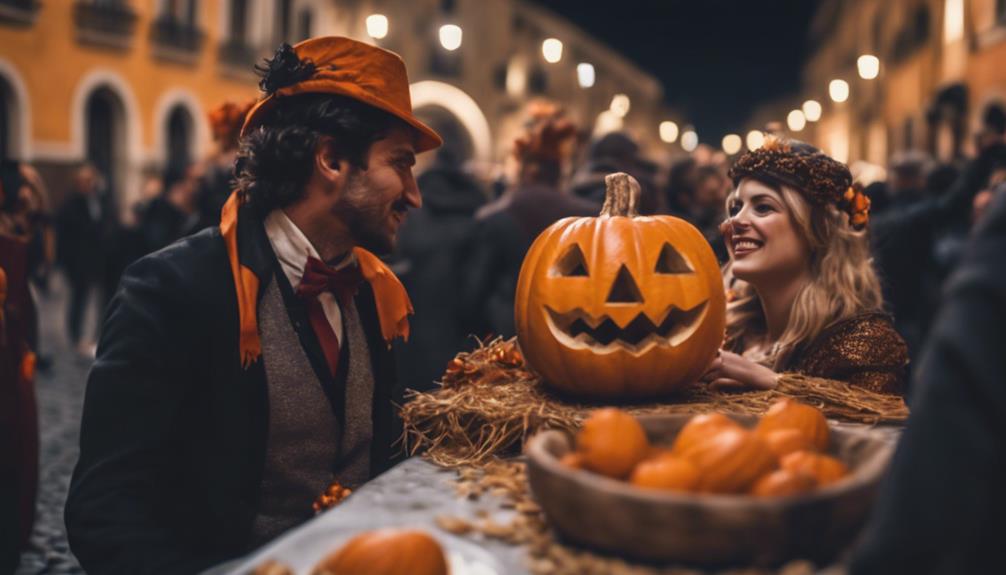As you consider celebrating Halloween, you may wonder about its pagan roots. The ancient Celtic festival of Samhain influenced the modern celebration, with its blend of harvest rituals and Christian traditions. While some Christians view Halloween as a pagan-rooted holiday to be avoided, others see it as an opportunity to share the Gospel. The Bible doesn't directly mention Halloween, but principles of faithfulness and glorifying God guide Christian decisions on whether and how to celebrate. Whether you're concerned about the celebration's origins or seeking ways to balance faith and cultural practices, exploring the complexities of Halloween will help you make an informed decision.
Key Takeaways
• Understanding Halloween's origins in ancient Celtic festivals and pagan traditions is crucial in deciding whether to celebrate it.
• Christian perspectives on Halloween vary, with some viewing it as a pagan-rooted holiday to avoid, while others see it as an opportunity to evangelize.
• Celebrating Halloween can be done in a way that brings glory to God by incorporating elements that reflect Christian values and principles.
• The Bible does not directly mention Halloween, but biblical principles of faithfulness, obedience, and glorifying God guide Christian decisions on celebrating the holiday.
• Focusing on the true meaning of Halloween, honoring saints and martyrs, and sharing the Gospel with others can help glorify God on Halloween.
Understanding Halloween's Pagan Roots
As you explore the history of Halloween, you'll discover that this popular celebration has its roots firmly planted in the ancient Celtic festival of Samhain.
This pagan festival marked the end of the harvest season and the beginning of winter, a time when the boundary between the living and the dead became blurred.
The Celts believed that on Samhain, spirits of the dead returned to earth, and they'd light bonfires and wear costumes to ward off any malevolent entities.
The origins of Halloween are deeply rooted in these pagan traditions, which were later influenced by the Roman Catholic Church's establishment of All Saints' Day on November 1.
This Christian celebration was followed by All Souls' Day on November 2, and the evening before became known as All Hallows' Eve, later shortened to Halloween.
Understanding the pagan roots of Halloween is essential to grasping the evolution of this celebration over time.
The Evolution of Samhain Traditions
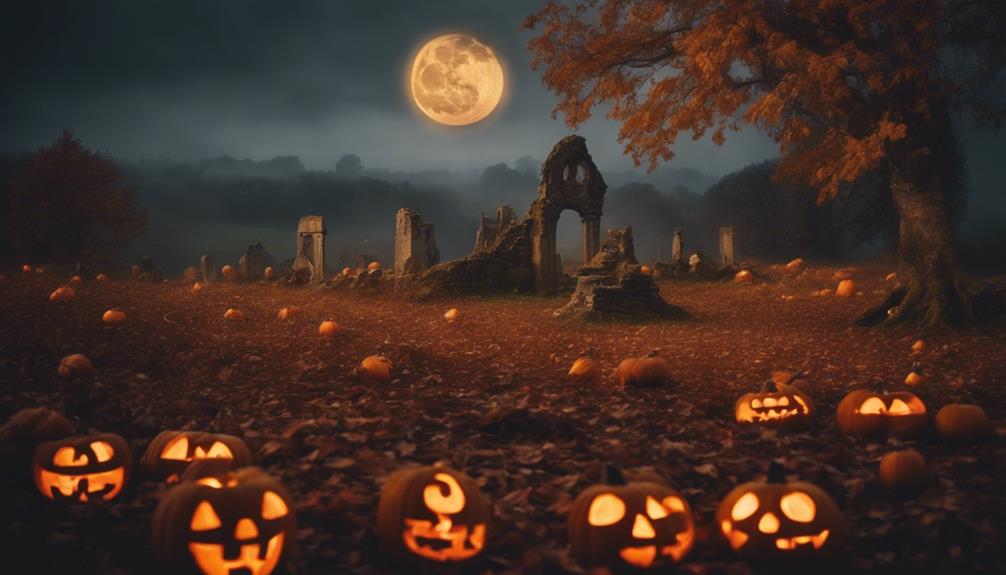
As you explore the evolution of Samhain traditions, you'll discover how ancient Celtic practices, festive harvest rituals, and early Christian influence have shaped the modern celebration of Halloween.
These factors have contributed to the holiday's transformation over time.
Ancient Celtic Practices
You're likely familiar with the spooky atmosphere and supernatural themes that dominate modern Halloween celebrations, but the ancient Celtic practices that birthed these traditions were far more complex and multifaceted.
The Celts, a pagan people, celebrated the festival of Samhain, which marked the end of the harvest season and the beginning of winter. This pagan celebration was a time to honor the dead, and the Celts believed that on Samhain, the boundary between the living and the dead became blurred.
They'd light bonfires, wear costumes, and leave food and drink offerings for their ancestors. The Celts believed that the veil between the worlds was at its thinnest on Samhain, allowing for communication with the spirit world.
This ancient Celtic celebration has evolved over time, influencing modern Halloween traditions. The pagan roots of Halloween are undeniable, but it's crucial to comprehend the significance of Samhain in Celtic culture to appreciate the true essence of this celebration.
Festive Harvest Rituals
During the ancient Celtic festival of Samhain, festive harvest rituals played a significant role in the celebration, with the Celts believing that the thinning of the veil between the worlds allowed for communication with the spirit world.
As the harvest season came to a close, Celtic pagans would prepare for the darker half of the year, when the days grew shorter and the nights longer. You would've seen bonfires lit to ward off malevolent spirits, and people wearing costumes to disguise themselves from any unwanted visitors from the other world.
The Celts would also leave food and drink offerings for their ancestors, believing that the boundary between the living and the dead became blurred during Samhain. These festive harvest rituals were an integral part of the Samhain celebration, marking the end of the harvest season and the beginning of winter.
Later, as the Roman Empire expanded, its own festivals and traditions, including the festival of Pomona, would influence the development of Samhain traditions, eventually giving rise to the Christian celebration of All Saints' Eve, later known as Halloween.
Early Christian Influence
One significant turning point in the evolution of Samhain traditions occurred when the Christian celebration of All Saints' Day was established in Rome in 609 AD.
This feast day, initially celebrated on May 13, was later moved to November 1, coinciding with the existing Celtic festival of Samhain.
The Christian church attempted to supplant the existing pagan traditions with Christian observances, leading to the evolution of Samhain traditions.
The Christian influence on Samhain traditions was further solidified by the addition of All Souls' Day on November 2, which honored the deceased faithful.
This blending of Christian and pagan traditions led to the development of modern Halloween customs, which were shaped by both Christian and Celtic influences.
As a result, the Christian influence on Samhain traditions transformed the way people celebrated the festival, incorporating Christian elements into the existing pagan traditions.
Today, you can still see remnants of this blending of traditions in modern Halloween celebrations.
Christian Perspectives on Halloween
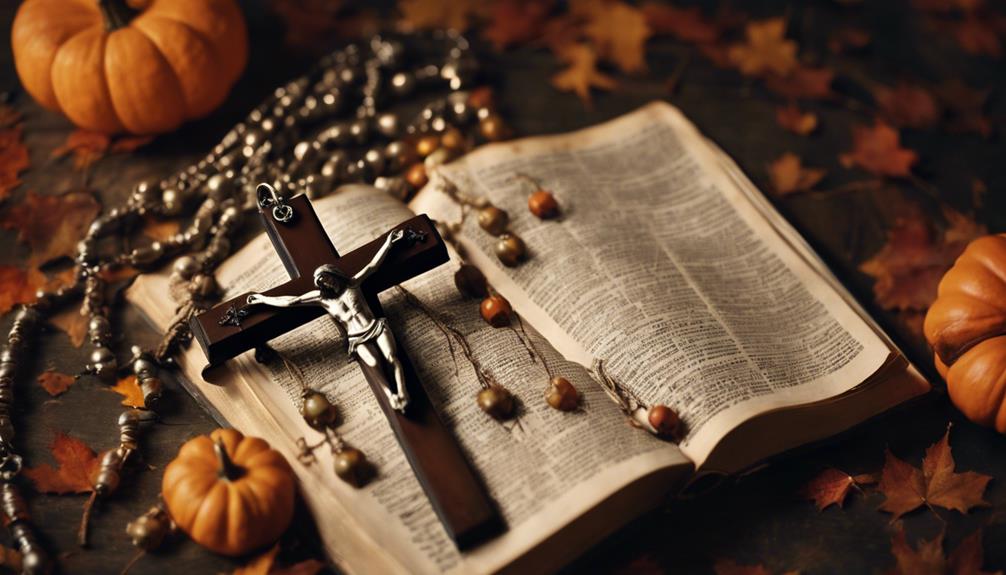
As you explore Christian perspectives on Halloween, you'll encounter a range of views on whether to celebrate the holiday.
You might wonder if there's a biblical mandate to participate in Halloween, and if so, how to honor God in the process.
Considering these questions can help you make an informed decision about your own Halloween celebrations.
Biblical Mandate to Celebrate
When considering the biblical mandate to celebrate Halloween, you should approach this pagan-rooted holiday with caution, recognizing that your participation can either glorify God or compromise your faith.
As you navigate the Catholic origins and pagan practices that have shaped the celebration of Halloween, remember that biblical values should be your guiding principle.
Ephesians 5:7-15 serves as a guiding passage, emphasizing the importance of living in the light and walking in obedience with God, rather than participating in worthless deeds of evil and darkness.
Your decision to celebrate Halloween should be made with the glory of God in mind, and you should aim to reflect biblical values and principles in your participation.
Honoring God on Halloween
Celebrate Halloween in a way that brings glory to God by incorporating elements that reflect Christian values and principles, such as hosting a harvest party, distributing gospel tracts, or engaging in community service projects.
You can focus on the harvest season, giving thanks for the blessings in your life, and expressing gratitude to God. This approach allows you to participate in the festive atmosphere of Halloween while keeping your priorities aligned with your faith.
As a Christian, you may be concerned about the pagan roots of Halloween, but you can choose to celebrate in a way that honors God. You can learn from the Catholic Church's approach, which has a long history of incorporating pagan traditions into Christian celebrations.
Debunking Neo-Pagan Claims
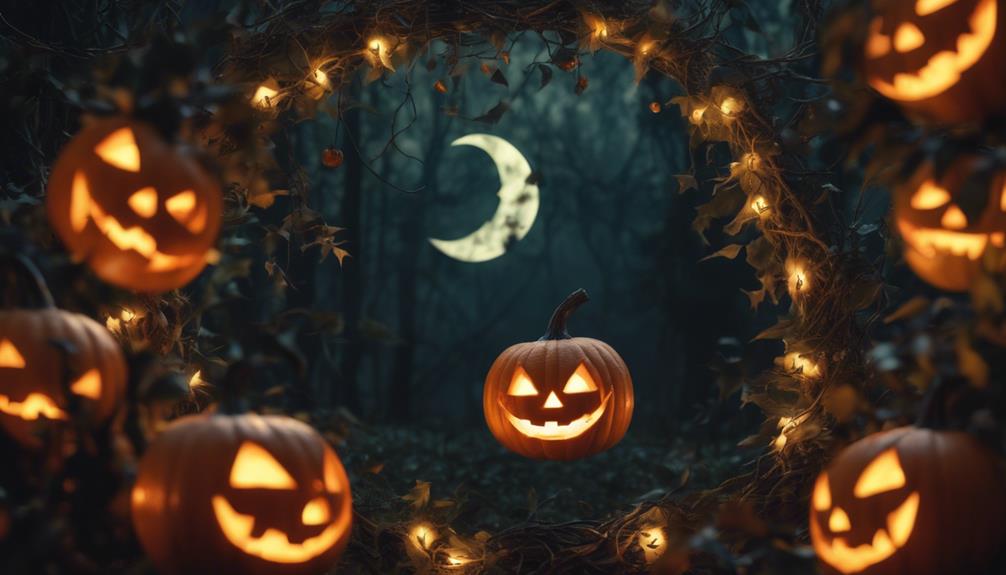
You've likely stumbled upon neo-pagan websites claiming that Halloween originated from the Gaelic harvest festival of Samhain, but surprisingly, there's no historical evidence to back up this assertion. In fact, the myth that Halloween has pagan origins may have originated from bad research and propaganda that developed after the Protestant Reformation.
| Claim | Truth |
|---|---|
| Halloween originated from Samhain | No historical evidence to support this claim |
| Early Christians baptized Samhain | No evidence to support this claim |
| Pagan practices influenced Halloween | Virtually all customs developed in the past 500 years |
| Catholic Church adopted pagan rituals | Christians cautious to adopt pagan practices |
| Protestant reformers rejected pagan influences | Rejected Catholic doctrine of Purgatory and prayers for the dead |
The Catholic doctrine of Purgatory and prayers for the dead were rejected by Protestant reformers, leading to a desire to distance themselves from anything pagan. This desire can be seen in documents dating back to the scripture, but Christians have been cautious to adopt elements of pagan ritual.
Halloween in the Bible
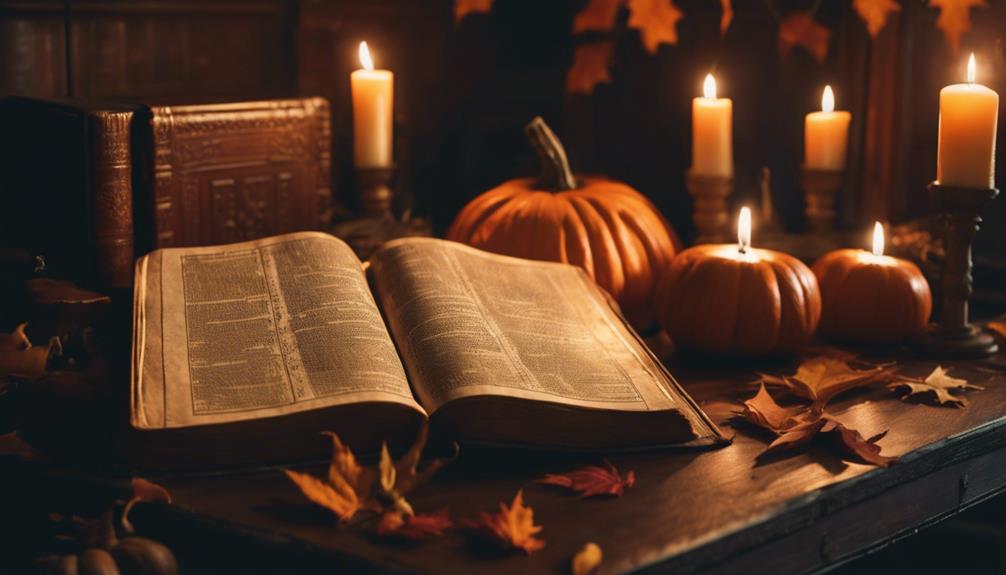
As you explore the connection between Christianity and Halloween, it's natural to wonder what the Bible has to say about this celebration.
However, you won't find a direct mention of Halloween in the Bible, since it's a modern celebration that originated from a combination of ancient Celtic and Christian traditions.
Instead, biblical principles can provide guidance for Christians celebrating Halloween. For instance, Ephesians 5:7-15 discusses the negative effects of worthless deeds of evil and darkness, which can inform Christian perspectives on Halloween.
The Bible also condemns practices such as witchcraft, sorcery, and divination in Deuteronomy 18:10-12, which are sometimes associated with Halloween.
Additionally, Acts 8:9-24 and Acts 19:18-21 provide examples of the early Christian Church's encounter with magical and supernatural practices, which can inform Christian perspectives on Halloween.
Ultimately, biblical principles of faithfulness, obedience, and glorifying God can guide Christian decisions on whether and how to celebrate Halloween.
Reasons to Celebrate or Not
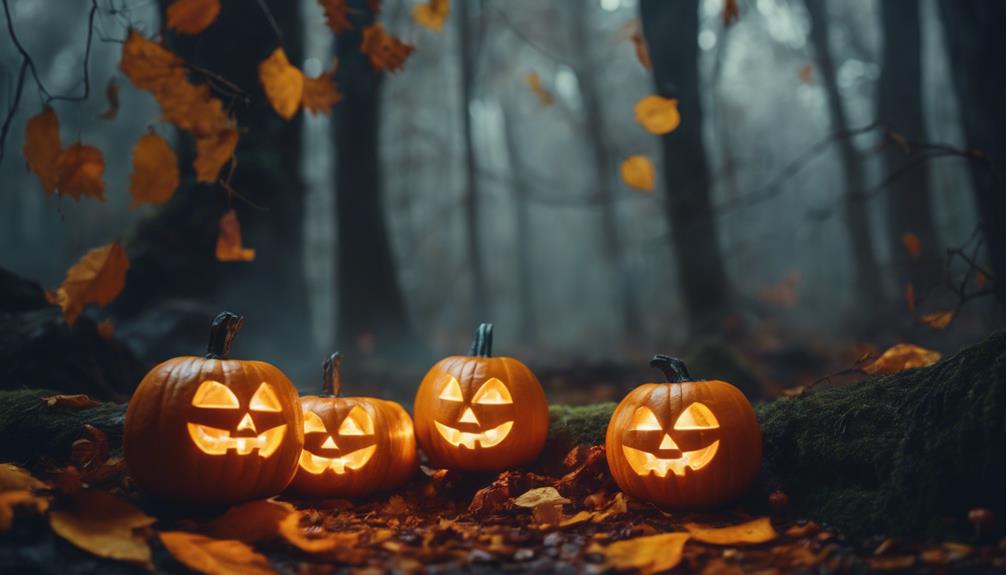
Frequently, Christians are torn between embracing Halloween as a fun and festive holiday and rejecting it due to its pagan roots and perceived promotion of darkness and evil. You may be wondering whether to celebrate Halloween or not, considering its ancient pagan origins.
On one hand, some argue that Halloween has been Christianized and can be celebrated as a Saints Day, honoring the dead and the saints. On the other hand, critics argue that Halloween promotes a fascination with evil, darkness, and the occult.
| Reasons to Celebrate | Reasons Not to Celebrate |
|---|---|
| Honoring the saints and the dead | Promotion of darkness and evil |
| Fun and festive holiday | Pagan roots and occult influence |
| Opportunity to engage with community | Negative influence on children and society |
| Sharing faith and demonstrating love | Focus on evil and darkness |
| Valuable opportunity for outreach | Glorification of the occult |
As you weigh the pros and cons, consider the New Testament's emphasis on living in the light and rejecting darkness. Ultimately, the decision to celebrate Halloween is yours, but it's essential to be aware of the holiday's roots and potential implications.
Glorifying God on Halloween
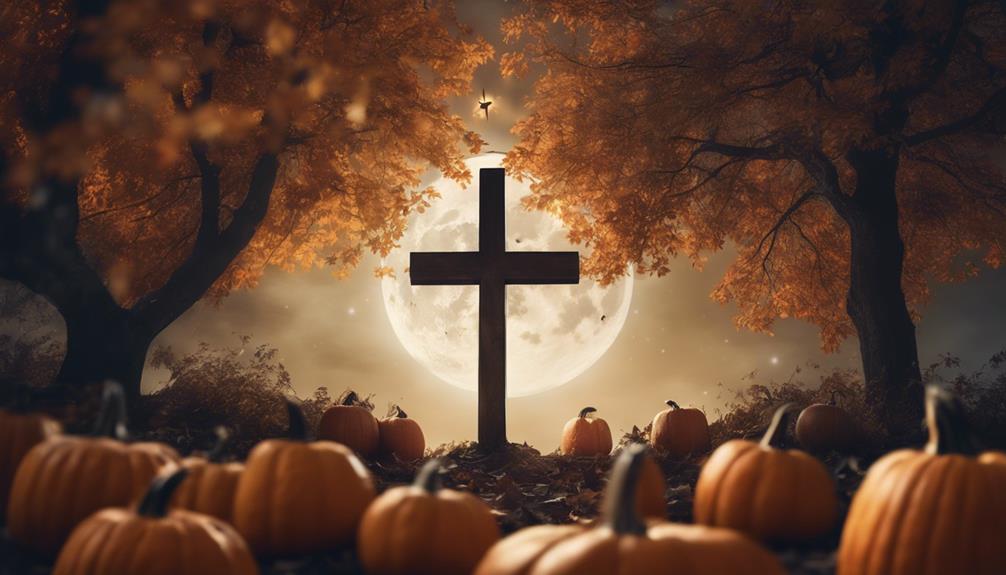
By focusing on the true meaning of Halloween, you can glorify God on this holiday by honoring the saints and martyrs who've dedicated their lives to Christ and the Church. You can celebrate Halloween in a way that honors God, redeeming the holiday from its pagan roots and focusing on the light of Christ instead of the darkness of the world.
Host alternative celebrations that focus on the Christian origins of the holiday, such as a saint-themed costume contest or a prayer vigil on All Saints' Eve.
Use Halloween as an opportunity to share the Gospel with your neighbors and friends, building relationships and spreading the message of God's love.
Prioritize faithfulness and obedience to God, celebrating Halloween in a way that brings glory to God, even in the midst of a holiday with pagan roots.
Balancing Faith and Cultural Practices
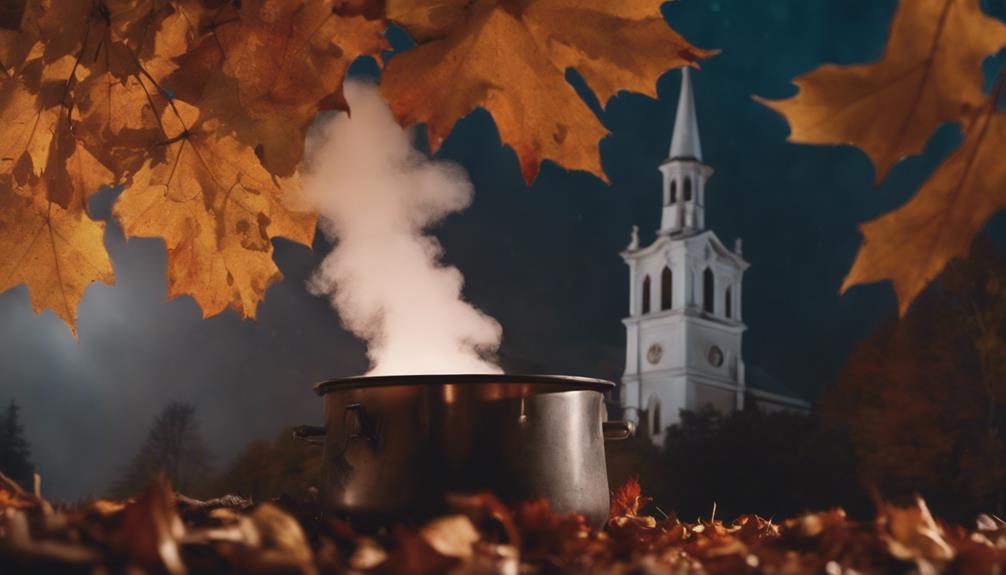
You face a delicate balance when celebrating Halloween, reconciling your faith with cultural practices that may have originated from pagan roots.
However, recognizing that Halloween's origins are rooted in Christian and Catholic traditions. Pope Gregory III, in the 8th century, designated November 1 as All Saints' Day, also known as Souls Day, to honor saints and martyrs.
This celebration marked a shift to the new Christian calendar, separating it from any pagan influences. As you participate in Halloween, remember that its modern traditions, including costumes and trick-or-treating, have Catholic origins and weren't influenced by pagan Celtic festivals.
In fact, the Irish Catholic peasants' customs, such as banging pots and pans, were a unique expression of their faith.
Frequently Asked Questions
Is Halloween Rooted in Paganism?
Halloween's roots are indeed tied to paganism.
The ancient Celtic festival of Samhain, celebrated on November 1st, marked the end of the harvest season and the beginning of winter, which was believed to be a time when the boundary between the living and the dead became blurred.
The Celts would light bonfires and wear costumes to ward off spirits, rituals that have evolved into modern-day Halloween traditions.
What Does the Bible Say About Celebrating Halloween?
The Bible does not directly mention Halloween, but it provides principles to guide behavior.
You are encouraged to be wise and discerning, avoiding practices that contradict Christian values.
While the Bible condemns witchcraft and idolatry, it doesn't specifically address Halloween.
Ultimately, it's up to you to decide whether celebrating Halloween aligns with your faith.
Should Christians Really Celebrate Halloween?
You're wondering if you, as a Christian, should celebrate Halloween.
The Bible doesn't directly address it, but principles like Ephesians 5:7-15 can guide you.
Consider the origins of Halloween, including its roots in the ancient Celtic festival of Samhain, and the potential for occultism and paganism to influence the modern celebration.
Ultimately, it's a matter of personal conviction, and you should seek guidance from Scripture, prayer, and wise counsel in making your decision.
What Is the Root to All Halloween Celebrations?
You're likely curious about the origins of Halloween.
The root of all Halloween celebrations lies in the ancient Celtic festival of Samhain. Celebrated on November 1, Samhain marked the end of the harvest season and the beginning of winter.
The Celts believed that on Samhain, the boundary between the living and the dead became blurred, and spirits of the dead returned to earth.
This festival has influenced the modern-day celebration of Halloween.
Conclusion
As you weigh the decision to celebrate Halloween, remember that its pagan roots are undeniable, but so is its evolution over time.
Like a canvas of diverse colors, Halloween has been shaped by various influences.
Ultimately, it's up to you to decide whether to celebrate, and if so, how to do so in a way that honors your faith and values.
By being informed and intentional, you can transform this autumnal celebration into a vibrant tapestry that glorifies God.
